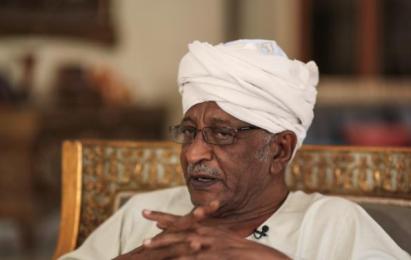Goodbye Dr Amin Mekki Madani

By Monim El Jak
I am a fan Antonio Gramci’s conception of the organic intellectual. I see a civil society leader as one who plays a significant role in the process of positive change: someone who deploys his intellectual capital into all layers of the public sphere in a humble and sincere manner. Such a civil society leader is usually also one who is aware of the fine line between being part of a necessarily politicized civil society and a partisan one.
Dr Amin Mekki Madani gained a high-level western education, occupied senior positions at the UN, and headed human rights organizations at national, regional and international levels. Yet he has continued right throughout to volunteer his knowledge and talents for positive social and political change in Sudan. In 2015 he risked his life, not for the first time, to spend months in prison because of his commitment to the Sudan Call Alliance that brought together the whole spectrum of political and civil parties around a platform for a genuine transition. In his late seventies, Dr Amin could have chosen to be a white cola intellectual—like many of his generation who are stuck in their egos and personal interests—but he has taken a path of advocating for the demands of his society as an organic intellectual and civil society leader.
Amin has also been central to trying to solve the twin polarities of politicization and depoliticization, which have been dominating public debate about the role of Sudanese civil society in shaping Sudanese politics. The Sudanese state has largely limited the civil society role to either oppression or co-option. Through his ongoing commitment and efforts, Amin- together with others principled civil society leaders— managed to engender the active focus of Sudanese civil society on day-to-day politics. He contributed to the development of alternative policies and the expansion of small, but sophisticated, efforts of civil society in day-to-day issue-based political struggle into broader processes of public opinion and policy-making.
I came to know Amin as a pioneering Sudanese who introduced the concepts and models of civil society engagement in peace and political processes. He continued prioritizing the need for such engagement for years and through tens of initiatives. His efforts ranged from participating in formal peace negotiations, building capacity, and teaching human rights, to contributing to forming and mediating political platforms, shaping agenda and charters, all the while infusing principles positions of peace, human rights, justice and development into the political agenda.
Throughout my short time knowing and working with Amin, he has always shown a strong commitment and dedication to achieving big goals through high standards and principles as well as a passion for supporting the new generation of activists. I saw him deploying his unique leadership and interpersonal and problem-solving’s skills in many fora, perhaps most effectively during the creation of the Sudan Call alliance which brought together a hitherto fractured and ideologically diverse civic, armed and political opposition around an agreed political platform, rooted in human rights, justice and democratic principles.
Dr Amin taught me what it means to have personal commitment and consistency to principle, build constituencies across generations and ethnicities, and to influence other based on real ground knowledge and solidarity. This is my definition and understanding of a true civil society leader, the organic intellectual.
The author is a Sudanese human rights activist
